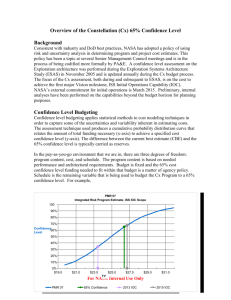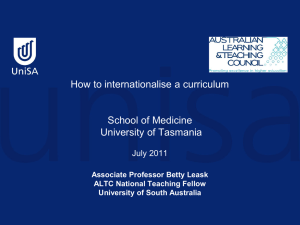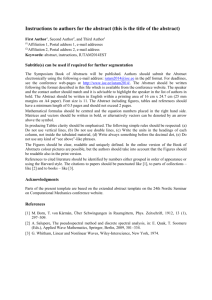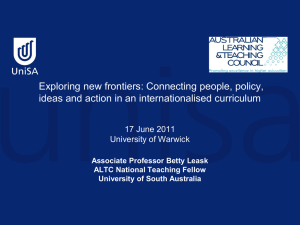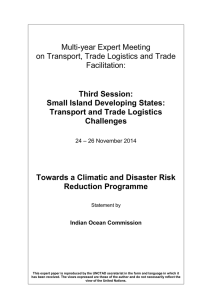An uncertain Olympic future: a decision making model for the... Committee in the midst of declining demand
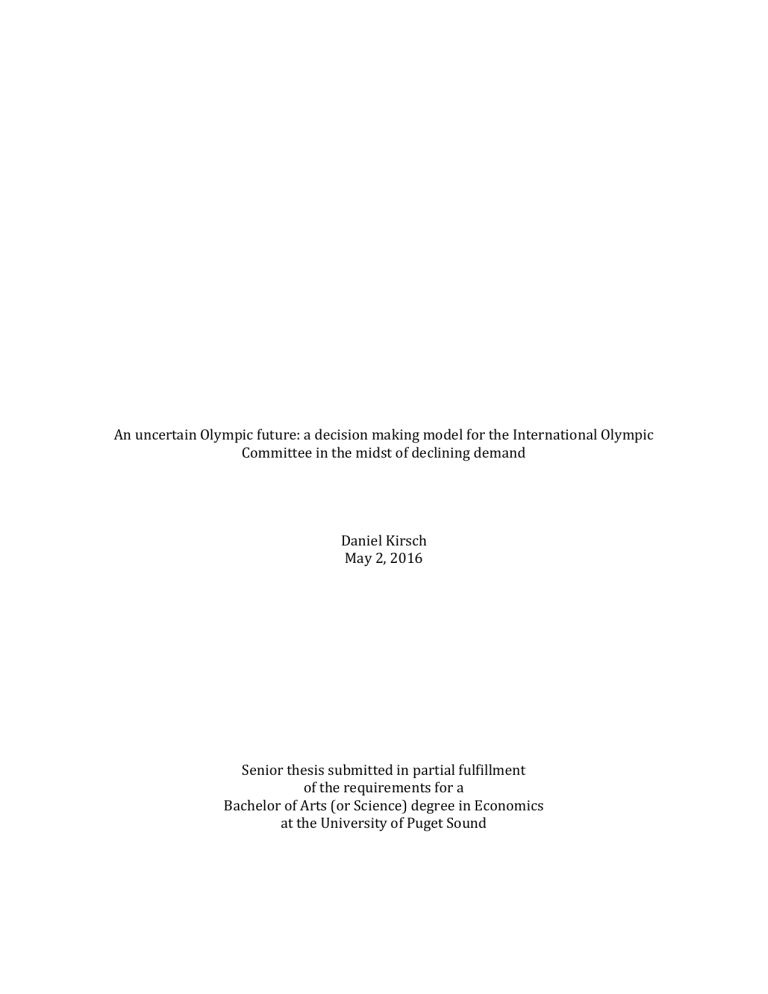
An uncertain Olympic future: a decision making model for the International Olympic
Committee in the midst of declining demand
Daniel Kirsch
May 2, 2016
Senior thesis submitted in partial fulfillment of the requirements for a
Bachelor of Arts (or Science) degree in Economics at the University of Puget Sound
Abstract
This paper investigates if the decrease in bidding cities for the Olympic Games will lead to reform by the International Olympic Committee. Through analysis of bidding trends, the bidding process, failed bids, and ex ante versus ex post Olympic reports, it is clear that the IOC’s rare pure monopoly status leads to costly failed bids and the winner’s curse for successful bids. These trends and others are causing a recent decline in cities’ willingness to bid for the Games. While it is harmful to the
IOC to have fewer bidding cities, this paper concludes that the IOC’s objective function of maximizing rents and creating an extravagant hosting environment to maintain a prestigious Olympic brand will prevent the IOC from restructuring the bidding process. While several reform options exist that would likely lead to an increase in bidding cities, the IOC is constrained by a need to preserve its pure monopoly status and thus will not make any of these changes.
1. Introduction
The Olympic Games is widely considered the most prominent international sporting competition, featuring more than one thousand athletes from over two hundred nations competing in an ever-growing list of Winter and Summer events
(Abrahams, 2015). No other competition is quite like the Olympics in size, internationalism, or rich history. In 1984, a multitude of events that hurt the
Olympic brand lead to only one city, Los Angeles, bidding to host the games.
In 1968, Mexico City hosted the first ever Summer Olympic Games held in a developing country. Unfortunately, the Games are most remembered for the political issues that stained the Olympic brand. Domestic students saw an opportunity to capitalize on the world stage that the Games presented for them, marching in opposition of the policies of the local government. Mexico responded to this protest with the Mexican Army in a massacre that killed over 200 demonstrators. Furthermore, political issues led the International Olympic
Committee (IOC) to ban apartheid South Africa to compete, and the United Nations refused to grant visas to the Rhodesian athletes after concluding that their
government demonstrated white supremacy. U.S. black athletes debated boycotting the games, but ended up competing and wearing black gloves as a political statement instead (Zimbalist, 2015).
The next three Olympics did no better in helping the Olympic brand. Munich hosted the 1972 Summer Games, which were marred by a Palestinian terrorist attack. The perpetrators broke into Olympic Village and held the Israeli team captive while demanding that 234 of their countrymen be released from Israeli prisons. The event led to sixteen dead in total, including eleven Israeli Olympians
(Karon, 2000). In 1976, Montreal estimated a total cost of C$120 million. When it was all said and done, the Games cost Montreal C$1.6 billion, a debt that took thirty years to pay off (Guttmann, 2002). In 1980, political decisions by the Soviet Union led sixty-two nations, including the United States, to boycott the Moscow Summer
Games (Zimbalist, 2015).
Due to a diminished Olympic brand as a result of these four Olympics, a private bid from Los Angeles was the only bid for the 1984 Summer Olympics. The
IOC initially refused the privately backed bid by citing Rule four, which claims that a host city had to take financial responsibility for the Games. When Los Angeles
Mayor Thomas Bradley refused, the IOC had no choice but to accept the private bid as there was no alternative (Zimbalist, 2015). Luckily for Los Angeles and the
Olympic brand, the 1984 Summer Olympics were a huge success. With no political issues and an operating surplus of $215 million, the 1984 Games marked a turning point for the Olympics (Ueberroth, 1985).
The success of the 1984 Olympics combined with the beginning of a massive increase in television rights fees led the IOC to throw amateurism out the door and allow professional athletes to compete in order to fully realize the Olympics’ commercial potential. To further maximize commercialism, the IOC also decided in
1992 that the Summer and Winter Olympics would no longer be held in the same year (Zimbalist, 2015). The success of the 1984 Olympics and the changes made to keep up with the times led to a spike in bidding cities. Six cities bid for the
Barcelona Games awarded in 1986, six cities bid for the Atlanta games awarded in
1990, eight cities bid for the Sydney Games awarded in 1993, and eleven bid for the
Athens Games awarded in 1997 (Sterken, 2012).
In recent years, however, there has been a decline in bids for the Olympics.
This is illustrated in the chart below:
Bid Year
1995
1997
1999
2001
2003
2005
2007
2009
2011
Year of Games
2002
2004
2006
2008
2010
2012
2014
2016
2018
Host City
Salt Lake City
Athens
Turin
Beijing
Vancouver
London
Sochi
Rio de Janeiro
Pyeongchang
Number of
Applicant Cities
9
11
6
10
7
9
7
7
3
Number of
Candidate Cities
4
5
2
5
3
5
3
4
3
2013
2015
2020
2022
Tokyo
Beijing
5
3
3
2
*Summer Olympic Numbers in Bold (less cities bid for Winter games overall, but both Summer and
Winter games have seen a decline in bids) (Zimbalist, 2015).
For different reasons, the IOC is slowly moving towards a lack of interest in hosting and could find themselves facing a 1984 Olympics situation in the near future. This paper investigates the reasons behind this decline in bids, and more importantly what the implications of a decline in demand for the Olympics are for the IOC based on their objective function. While previous literature has detailed the problem and presented potential solutions for reform, this analysis is the first to look from the economic perspective of the IOC and determine that ultimately no major changes will be made.
2. Cost Overruns
Cities hosting recent Olympic games and mega-sporting events in general have not experienced the same financial success as Los Angeles. The following chart details the initial bid amounts and the estimated final costs of hosting a megasporting event.
Host City or Country Year of Games Initial bid (billions of
USD)
Athens 2004 1.6
South Africa
London
Sochi
2010
2012
2014
0.3
4.0
12.0
Estimated final cost
(billions of USD)
16
5-6
15-20
51-70
Brazil (Stadiums only)
2014 1.1 5
*Includes data from two World Cups, South Africa 2010 and Brazil 2014 (Cottle, 2011).
These extremely drastic cost overruns occur for several reasons. Firstly, those who are likely to gain economically from hosting have an incentive to underestimate costs in order to convince their potential hosting government to support the bid effort. Real estate corporations, construction companies,
investment bankers, architectural firms, restaurants, media outlets, and hotels will benefit in the event that their city wins the bid. This may not happen if realistic cost estimates are given to the bidding government (Zimbalist, 2015). These companies and their hired consultants strategically underestimate costs in hopes of winning the bid, and in the event that their city is awarded the Games the infrastructure promised to the IOC must still be completed. As the chart above shows, this leads to massive cost overruns.
Other reasons for cost overruns include inflation occurring between the time the first bid is made and the actual Games eleven years later, increased real estate prices, and general price increases in the local economy leading up to the event
(Zimbalist, 2015). The primary reason for the huge debts occurred by local hosting governments, however, is the structure of the bidding process. The following section will detail how the current format leads successful bidding cities to suffer the winner’s curse and losing cities to incur massive financial losses, both of which are discouraging cities from bidding and contributing to the decline in bids.
3. The Bidding Process: Failed Bid Financial Losses and the Winner’s Curse
In order to understand the ways in which the bidding process hurts both the winning and losing cities, the bidding process must be explained. The bidding process has two stages: applicant cities and candidate cities. To become an applicant city costs $150,000, and the IOC evaluates these applicant cities and invites the best bids to become candidate cities. This second and final stage costs
$500,000, and the IOC votes on which candidate city will host the games (Olympic
Games Candidature Process, 2015).
Far more expensive than the money required for the bid itself is the cost associated with bidding. These include hiring consultants, hosting IOC executives, attending meetings with IOC members, and many more. The bidding system incentivizes maximum effort from all applicants, and this requires cities to spend millions of dollars with no guarantee of securing the winning bid (Yildirim, 2005).
Chicago spent over $100 million and Tokyo spent $150 million on their failed bids to host the 2016 Summer Olympics (De Nooji, 2012). These numbers are clearly discouraging to a local government deciding whether to put forth a bid for the
Games or not.
The cities that are awarded hosting rights are subject to a phenomenon known as the winner’s curse. One sports economist defined the winner’s curse as
“the tendency of a winning bid to be in excess of the real value of the asset sold in the auction”(Sandy, 2004). Along with the previously discussed underestimation of costs, it is in a bidder’s best interests to encourage ambitious project proposals in order to impress the IOC. Economist Wladimir Andreff describes these two opposing interests as an incentive for bidding cities to “overbid upward with respect to the quality and downward with respect to the publicized cost”(Andreff, 2012). It is difficult to estimate the value of the Olympics due to immeasurable intangibles and long term investments that are built for the Games but used for years to come.
There are, however, several indicators that support the hypothesis that the majority of winning bids experience the winner’s curse. These include the aforementioned cost overruns, additional public subsidy, a disappointing number of foreign visitors, and host city fiscal deficit and debt. Upon analyzing these factors, Andreff
recognized a winner’s curse in the vast majority of the Olympic Games held since
1972. The city least impacted by the winner’s curse was Los Angeles, which is expected because they did not have to outbid anybody.
The problems highlighted with the hosting city selection process have clearly had a negative impact on the desire to host the Olympic Games. Along with the steady decline in bids, it is worth noting that four cities (Oslo, Stockholm, Lviv, and
Krakow) withdrew from the bidding for the 2022 Winter Olympics, leaving only
Almaty and eventual winner Beijing. Norwegian Prime Minister Erna Solberg explained Oslo’s decision to withdraw after being selected as a candidate city by stating that, “a big project like this, which is so expensive, requires broad popular support and there isn’t enough support for it”(Abend, 2014). An estimated one million people in Rio de Janeiro have protested and rioted because of their city’s choice to host the games due to a want for the city to invest in clean drinking water, education, and other current problems instead of a mega sporting event (Barbassa,
2015). The decline in bids and overall negative attitude toward hosting has put pressure on the IOC to reform the bidding process. In order to understand how the
IOC will respond, it is necessary to understand their objective function.
4. The Objective Function of the IOC
The website for the International Olympic Committee boasts a list of objectives or duties meant to impress the public. This list includes “encourage and support the promotion of ethics in sport” and “encourage and support measures protecting the health of athletes”(The Organisation, 2015). While these sound appealing, they do not represent the true objective function of the IOC. The
overarching objective function of the IOC is to host the highest quality Summer and
Winter Games. For the IOC, this means high quality sporting venues, transportation, lodging, and security. This objective function also encompasses how the Olympic brand is portrayed worldwide. In this way, the IOC hopes to maximize worldwide media coverage, larger than life portrayals of Olympians, and extravagant opening and closing ceremonies. This will also lead to higher revenues, which the IOC gets a share of without bearing any responsibility for the costs of hosting. Therefore, the
IOC has the objective of maximizing revenue, even if costs far exceed these revenues for host cities. In order to accomplish these objectives, it is in the IOC’s best interest to encourage overbidding.
In order to achieve their objective function, the IOC has to attract a large pool of cities able to host a high quality Olympic Games and willing to pay as much money as necessary to do so. The IOC can accomplish this by eliminating potential host cities from the running that do not demonstrate the ability to host a high quality Olympic Games or have a low willingness to pay. The two stage bidding process is designed to maximize the amount of economic rent that can be extracted from the winning host city (Humphreys, 2012).
Economic rent is defined as, “the positive difference between the actual payment made…and the payment level expected…due to its exclusivity or scarcity”(Economic Rent, 2007). In other words, the demand that exists for the hosting rights combined with the fact that only one city can host each Olympics allows the IOC to create an environment in which the winning city must overbid.
This is done through the two stage bidding process. Cities with the means to bid
high know that in the applicant stage low quality bids exist, and therefore the potentially high quality bidders need only to bid slightly above their lesser competitors to reach the candidate stage. Thus, in stage one it is not necessary for bidding cities to fully reveal their willingness to pay. Once a candidate city, however, as long as two or more cities reach this stage there is incentive to reveal a bidder’s full willingness to pay. When high quality bidders know that they are competing against other high quality bids, cities are encouraged to revise their bid up to the maximum they are willing to pay as this gives them the best chance to win the auction (Humphreys, 2012).
Maximizing rent is only possible for the IOC because they are a monopoly. In a market where competition exists, this competition between entities drives prices down. While the IOC is constrained on one side by the requirement to choose a host city that can deliver the Games as promised on schedule every four years, they are also constrained by a need to preserve their monopoly status; this is a necessity in continuing to achieve their objective function.
5. The IOC as a Monopoly
Although extremely rare, a pure monopoly is an entity with remarkable market power due to several key characteristics. It is the single seller of a unique product with no close substitutes, and therefore can set any price as long as a high enough demand exists. The following economic model represents a pure monopoly:
(Monopolies, 2016).
In the case of the Olympics, the “super-normal profits” represent the excess spent on hosting the Olympics in order to make it as impressive of an event as possible, as well as the revenues they maximize by encouraging this extravagance.
This exemplifies the power the IOC has to achieve their objective function, and also how this results in a winner’s curse for the cities that are awarded hosting rights. Of course this monopoly power only exists if there are at least two bidding cities with a high willingness to pay for the Games. Since the Los Angeles Summer Olympics in
1984, this has been the case. Even with a decline in bids, only two cities are required to have a willingness to pay of A on the demand curve (represented by AR) in order for the Olympics to continue to achieve their objective function.
The Olympics lose this monopoly power, however, if only one city produces an acceptable bid. This was the case in 1984, when the IOC was forced to allow a
private bid from Los Angeles due to a lack of other interest and a need to ensure that the Games maintain their regularly scheduled hosting. In the above model, this would be represented by the demand curve (AR) shifting left to cross point B on the
Average Total Cost curve. Point B represents the minimum bid necessary to host an
Olympic Games, as was the case for Los Angeles in 1984. This minimum bid is all that would be required to win hosting rights with no competition.
With the IOC facing a trend that could lead to a loss in their monopoly power, it is in their best interests to increase the pool of potential host cities with a high willingness to pay. IOC President Thomas Bach has recognized the problem and promised to make reforms in the near future, but no major changes have occurred yet (Gibson, 2014). The next section will detail how the IOC has responded so far to discontent from the United States surrounding the current format, highlighting the fact that the IOC is completely willing to award the Olympics to cities from developing countries.
6. Conflict Between the USOC and the IOC
Throughout the rise in commercialism, the television rights fees for the
Olympic Games have grown rapidly. This trend is illustrated in the following chart:
Summer Games
1960 Rome
1964 Tokyo
1968 Mexico City
1972 Munich
1976 Montreal
1980 Moscow
1984 Los Angeles
1988 Seoul
1992 Barcelona
1996 Atlanta
2000 Sydney
2004 Athens
2008 Beijing
2012 London
Broadcast
Revenue
(millions of
USD)
1.2
1.6
9.8
17.8
34.9
88
286.9
402.6
636.1
898.3
1,330.0
1,490.0
1,750.0
2,600.0
Winter Games
1960 Squaw Valley
1964 Innsbruck
1968 Grenoble
1972 Sapporo
1976 Innsbruck
1980 Lake Placid
1984 Sarajevo
1988 Calgary
1992 Albertville
1994 Lillehammer
1998 Nagano
2002 Salt Lake City
2006 Turin
2010 Vancouver
2016 Rio de Janeiro ??? 2014 Sochi
The U.S. Organizing Committee felt entitled to the largest share of the
1,825
Broadcast
Revenue
(millions of
USD)
0.05
0.94
2.6
8.5
11.6
20.7
102.7
324.9
291.9
352.9
513.5
738.0
831.0
1,280.0 television revenues split between the OCOG’s. After all, even with emerging television markets in other countries the United States still generated 53 percent of total Olympic television revenue between 2005 and 2008. The IOC recognized this and gave the USOC at the time 12.75 percent of the total television revenues distributed to OCOG’s, the largest share of any of the OCOG’s, but the USOC felt they deserved more (Zimbalist, 2015). So on July 8, 2009, the USOC announced a plan to debut the US Olympic Network in response to displeasure over the United States share in television revenues. This move attempting to directly undermine the monopoly power of the IOC was received negatively by the IOC and other NOC’s; the
potential USON would have negatively affected both of these parties. While the network was never launched, the timing of this announcement is suspected to have played a role in Chicago losing the bid for the 2016 Summer Olympics on October
2 nd , 2009 (Baade, 2012).
Instead the IOC awarded the games to Rio de Janeiro, Brazil, continuing a pattern of awarding recent Games to developing countries that require much higher infrastructure costs to host than a country like the United States. Of the winning host cities for the Olympics between 2014 and 2022, Tokyo was the only city not in a developing country (Japan). Sochi (Russia), Rio de Janeiro (Brazil), Pyeongchang
(South Korea), and Beijing (China) are all cities in developing countries (List of
Developing Countries, 2015). Based on the fact that Sochi spent $50 billion to host in 2014 and Rio de Janeiro is projected to spend $20 billion on the 2016 Olympics, the financial burdens associated with the current hosting format are even greater for developing countries. Developing countries are willing to spend these insane sums of money because they view hosting a mega-sporting event as a “coming-out party signaling that it is now a modernized economy, ready to make its presence felt in world trade and politics”(Zimbalist, 2015). Developing countries governments feel this way because “the media attention paid to mega events creates considerable opportunities for gaining…prestige”(Kesenne, 2012).
While it makes much more sense economically for a city in the United States to host the Olympics than one in a developing country like Brazil, it is not in the
IOC’s objective function to choose the city best prepared to host the games. As long as a city’s bid is high enough to invest in the infrastructure to host an extravagant
event seven years later, the IOC will see no issue in awarding the bid to a city in a developing country over a city in a developed country with more existing infrastructure in place. As previously stated, the IOC does not take on any hosting costs while reaping the benefits of television revenues and corporate sponsors; in this way the IOC has no incentive to minimize hosting expenses as its only concern is maximizing revenue.
The United States challenged the IOC’s monopoly power unsuccessfully again in February of 2013. Head of the USOC Larry Probst was expected to announce a list of finalist cities to bid for the 2024 Summer Games. Instead, Probst proclaimed that in the wake of failed New York (2012) and Chicago (2016) bids, the US would abstain from the bidding process until the IOC announced plans for reform. As the country with the greatest Olympic television revenues, the IOC would likely benefit from increased ratings due to events broadcast live in prime time in U.S. time zones.
Probst clearly believed the U.S. to be an important enough potential host country for the IOC to react to this threat. The IOC did not budge, however; Probst caved and eventually announced San Francisco, Los Angeles, Washington D.C., and Boston as the four finalists (Zimbalist, 2015).
The IOC, despite promises from President Thomas Bach, has so far shown a lack of interest in reforming the selection process. Even as a decline in bids threatens to eliminate its monopoly power, the IOC has continued to achieve its objective function while refusing to be bullied by the United States into making changes. Several options exist for the IOC to increase the number of bidding cities, but there is no indication that these options are being seriously considered. The
next section will detail these reform possibilities and ultimately conclude that in accordance with its objective function, the IOC will make no major changes to the current format.
7. Predicting Future IOC Actions
As discussed earlier, it is necessary to have multiple bidding host cities in order for the IOC to maximize its rents, which is its objective function. With just one bidding city, the IOC loses all monopoly power and must allow the games to be hosted at the minimum cost necessary because they are constrained by a need to host the Winter and Summer Olympics on schedule every four years. On the other hand, the IOC is constrained by a need to maintain monopoly power in order to achieve all objectives in maximizing revenues and extravagance to maintain a prestigious Olympic brand. Thus, a decision making model for the IOC assumes they will do anything to increase the pool of candidate cities with a high willingness to pay as long as it has zero potential diminishing effect on its monopoly power.
Unfortunately, no reform option meets these requirements because by nature they are contradictory.
One suggested solution is to control the number of bidders through a continental rotation process. In this system, the games would be allocated to one of the six major continents for each bidding cycle (Zimbalist, 2015). Common sense would say that this would only further decrease the pool of bidding cities with a high willingness to pay, and this may be true. With less risk of a costly failed bid, however, more cities may be inclined to join the auction when competing only within one continent. Even if this was the case, cities may be less inclined to fully
reveal their willingness to pay with the knowledge that the IOC has no choice but to award the games to a city within that continent. For this reason, the IOC is unlikely to implement a continental rotation system.
Another option is to accept the use of older, more modest stadiums. Stadium renovation is extremely costly, and stadiums built from scratch for the Olympics are often neglected after one month of use during the games. Downgrading stadium expectations would reduce bid costs and possibly lead to an increase in potential hosting cities, but this contradicts the IOC’s objective function to maximize the extravagance of the Games in order to increase revenues and maintain a prestigious
Olympic brand. As outlined in its objective function, overbidding is advantageous for the IOC and this strategy would reduce bidding costs.
The IOC could award the hosting rights earlier in the bidding process, decreasing the financial risk of a costly failed bid. While cities currently abstaining from bidding due to the fear of an expensive failure would be less discouraged to bid, the IOC would run the risk of costly mistakes due to a lack of planning. The current format has all candidate cities spending large sums of money in order to create an extensive plan that allows the IOC to determine which potential host city will maximize rents. Less time and money spent in the bidding process means more difficulty for the IOC in determining which bidding city maximizes its objective function.
Several other strategies exist, but none increase the number of potential bidding cities without having a negative effect on the IOC’s ability to maximize rents.
This is inevitable; a decline in bids exists because of the winner’s curse and the risk
of an expensive failed bid, and these problems exist as a result of the IOC maximizing rents. Because of this contradiction, no solution exists for the IOC that increases potential high quality bids while maintaining full monopoly power.
Based on this analysis, it can be determined that no major reforms will be undertaken by the IOC in the near future. As long as they can convince at least two cities to bid with a high willingness to pay, the IOC will not lose the ability to maximize rents. While they run the risk of losing all monopoly power, this is preferable to giving it away voluntarily. In all likelihood, the IOC can continue for now to campaign cities to bid in the current format and receive two competing bids willing to reveal their full willingness to pay to outdo their adversary, no matter the financial detriment. The developing countries that have been awarded recent
Games have demonstrated a willingness to invest billions to host, and the IOC has no issue awarding these ill-advised bidding cities the hosting rights. As time passes, a new wave of developing countries will likely follow suit and bid highly in an attempt to establish a presence in world politics and economics. No matter the negative press and discouraging financial statistics, there is always hope of convincing local governments to bid on the games because “the staging of a successful Olympic
Games generates accolades in the form of prestige, international stature, fame, and other intangible factors”(Humphreys, 2012). Look no farther than the United States to prove this claim: despite unhappiness with the IOC, Los Angeles is one of 3 candidate cities for the 2024 Summer Olympics that will be awarded in 2017
(Lovett, 2015).
In the worst-case scenario for the IOC, only one city bids for a future
Olympics and they lose their monopoly power for a year. It is unfathomable that nobody would agree to host the Games, because with only one bidder no winner’s curse exists and the IOC is forced to allow the minimal costs necessary to ensure the scheduled celebration of the Games. In this scenario, the IOC would convince a city from a developed country with the majority of the necessary infrastructure in place to host, such as Los Angeles in 1984. Without competing bids leading to a winner’s curse, the hosting city would likely experience economic gain just as Los Angeles did in 1984. This would likely increase the demand for the Games as other cities saw this success, and the IOC would gain their monopoly power back with multiple bidders allowing a maximization of rents to occur once again. Even with the decline in bids, this scenario seems unlikely to occur in the near future. If the IOC continues to claim systematic changes while making small, insignificant modifications to the current system and campaigning developing and developed countries alike to bid for the Games, the IOC’s monopoly power is unlikely to dissipate in the foreseeable future.
8. Conclusion
The recent decline in demand for the hosting of the Olympics is a result of massive cost overruns experienced by host cities and a bidding system that causes both the winner’s curse and millions of dollars wasted in failed bids. This format exists due to the IOC’s objective function to maximize its rents, a power derived from a rare pure monopoly status. The IOC only loses this status if they cannot attract two potential candidates with a high willingness to pay for the games. While
the IOC benefits from a larger pool of potential host cities, its objective function reveals that it will not willingly give up any monopoly power to do so. Due to the fact that any reform increasing the demand for bidding cities negatively impacts rent maximization, no major amendments are available to the IOC. This decision making model leads the IOC to take no major action and hope that they continue to attain two or more candidate cities with a high willingness to pay. With developing countries willing to spend billions to host based on aspirations of an increased world presence, local governments that may be influenced by the international stature of hosting such a prestigious tournament, and a committee dedicated to convincing cities that hosting the Olympics is a smart decision, it is probable that the
IOC will continue to exercise monopoly power and succeed in maximizing rents for years to come.
Citations
Abend, Lisa. "Why Nobody Wants to Host the 2022 Winter Olympics." Time . 3 Oct.
2014. Web. 16 Apr. 2016. <http://time.com/3462070/olympics-winter-
2022/>.
Abrahams, Harold Maurice. "Olympic Games." Britannica . 31 July 2015. Web. 4 Apr.
2016. http://www.britannica.com/sports/Olympic-Games .
Andreff, Wladimir. "The winner’s curse: why is the cost of mega sporting events so often underestimated?" International Handbook on the Economics of Megasporting Events . Ed. Wolfgang Maennig and Andrew Zimbalist. Edward Elgar
Publishing, 2012.
Baade, A. Robert and Allen R. Sanderson. "An analysis of the political economy for bidding for the Summer Olympic Games: lessons from the Chicago 2016 bid."
International Handbook on the Economics of Mega-sporting Events . Ed.
Wolfgang Maennig and Andrew Zimbalist. Edward Elgar Publishing, 2012.
Barbassa, Juliana. "Brazil Is in Crisis Ahead of 2016 Olympics in Rio." CNBC . 17 Aug.
2015. Web. 16 Apr. 2015. <http://www.cnbc.com/2015/08/17/brazil-is-incrisis-ahead-of-2016-olympics-in-rio-commentary.html>.
Cottle, Eddie, ed. South Africa's World Cup: A legacy for whom?
. Scottsville: University of KwaZulu-Natal Press, 2011.
De Nooij, Michiel. "Mega Sport Events: A Probabilistic Social Cost–Benefit Analysis of
Bidding for the Games."
1527002512461798.
Journal of Sports Economics (2012):
"Economic Rent." Investopedia . 27 May 2007. Web. 20 Apr. 2016.
<http://www.investopedia.com/terms/e/economicrent.asp>.
Gibson, Owen. "IOC President Thomas Bach Promises to Bring Harmony to Olympic
Bids." The Guardian . 23 Oct. 2014. Web. 21 Apr. 2016.
<http://www.theguardian.com/sport/2014/oct/23/ioc-olympics-thomasbach-olympic-bids>.
Guttmann, Allen. The Olympics, a history of the modern games . University of Illinois
Press, 2002.
Humphreys, Brad R. and Henry van Egteren. "Mega sporting event bidding, mechanism design and rent extraction." International Handbook on the
Economics of Mega-sporting Events . Ed. Wolfgang Maennig and Andrew
Zimbalist. Edward Elgar Publishing, 2012.
Karon, Tony. "Revisiting the Olympics' Darkest Day." Time . 12 Sept. 2000. Web.
05 Apr. 2016.
<http://content.time.com/time/arts/article/0,8599,54669,00.html>.
Kesenne, Stefan. "The economic impact, costs and benefits of the FIFA World Cup and the Olympic Games: who wins, who loses?" International Handbook on the Economics of Mega-sporting Events . Ed. Wolfgang Maennig and Andrew
Zimbalist. Edward Elgar Publishing, 2012.
"List of Developing Countries." IUGG . 2015. Web. 21 Apr. 2016.
<http://www.iugg2015prague.com/list-of-developing-countries.htm>.
Lovett, Ian. "Los Angeles to Be U.S. Bidder to Host 2024 Olympics." The New York
Times . 01 Sept. 2015. Web. 21 Apr. 2016.
<http://www.nytimes.com/2015/09/02/sports/olympics/los-angelesmoves-ahead-with-bid-to-host-2024-olympics.html?_r=0>.
"Monopolies." Economics Online . 2016. Web. 21 Apr. 2016.
<http://www.economicsonline.co.uk/Business_economics/Monopoly.html>.
"Olympic Games Candidature Process." Olympic.org
. 2015. Web. 18 Apr. 2016.
<http://www.olympic.org/olympic-games-candidature-process>.
Sandy, Robert, Peter J. Sloane, and Mark S. Rosentraub. The economics of sport: an international perspective . Palgrave Macmillan, 2004.
Sterken, Elmer. "Economic Impact of Organizing Large Sporting Events."
International Handbook on the Economics of Mega-sporting Events . Ed.
Wolfgang Maennig and Andrew Zimbalist. Edward Elgar Publishing, 2012.
"The Organisation." Olympic.org
. 2015. Web. 30 Nov. 2015.
<http://www.olympic.org/about-ioc-institution>.
Ueberroth, Peter, Richard Levin, and Amy Quinn. Made in America: His own story .
Horizon Book Promotions, 1985.
Yildirim, Huseyin. "Contests with multiple rounds." Games and Economic
Behavior 51.1 (2005): 213-227.
Zimbalist, Andrew. Circus Maximus: The economic gamble behind hosting the
Olympics and the World Cup . Brookings Institution Press, 2015.



